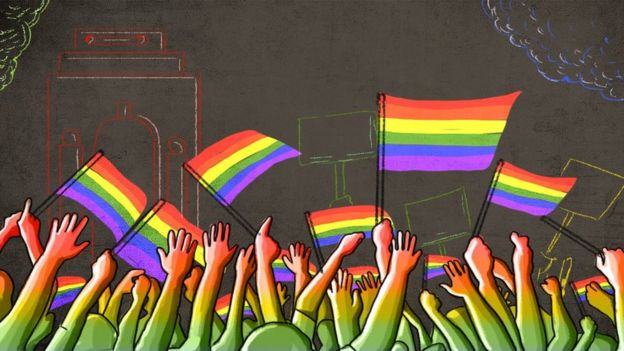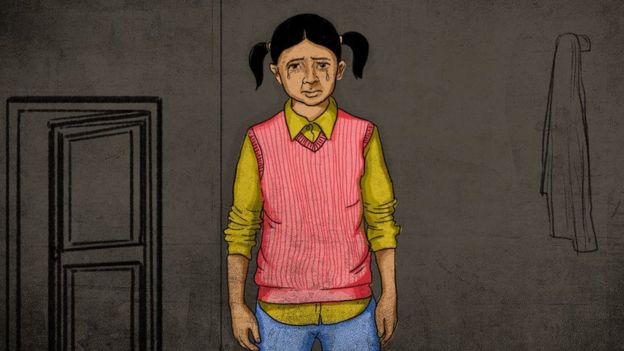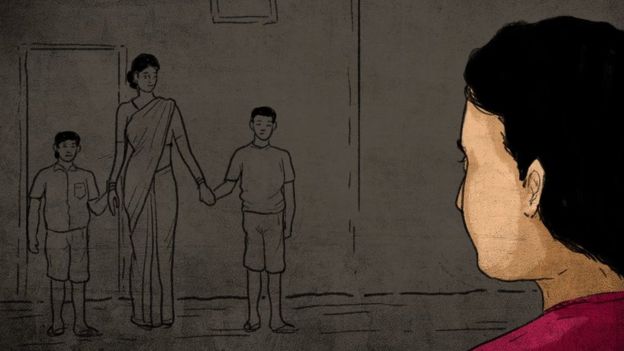One Thing is to be Gay in Delhi India But in Rural India is Another World
This story was posted on BBC News, Delhi by By Vikas Pandey
The Supreme Court's decision to make gay sex legal in India has been hailed as historic.
LGBT groups in cities across the country have been celebrating the ruling as the "beginning of a new era".
But the reality for members of the LGBT community in rural India is different. They believe it will take a long time to change regressive attitudes towards them.
Here three gay people from rural India tell their stories.
Arun Kumar, 28, northern state of Uttar Pradesh
I am really happy with the court's decision. It will help people in cities express themselves without fearing the law.

But sadly, it's different for people like me who live in villages.
It's not the law that we fear - what troubles us is people's perception. I hope that the media's coverage of the verdict will help people understand that homosexuality is normal.
But LGBT people have a long battle ahead of them before they can live without fear. I have lived my whole life in fear and this may not change in the near future.
I was 14 when I realised I was attracted to boys. I was initially confused. I tried not to think about it. But the feeling kept troubling me, so I decided to talk to a friend about it.
His reaction shocked me. He told me it was disgusting to even think about homosexuality. He started to avoid me and, soon, we barely spoke to each other. For years after that, I never spoke about my sexuality.
When I felt sad, I would go to the fields and talk to trees and plants. I didn't feel judged and they became my friends. I still talk to them. I was 18 when I moved to a nearby town to go to college. But things didn't change. I was depressed and the world didn't make sense to me.
I always felt guilty but I didn't understand why. I wasn't doing anything bad. I eventually mustered enough courage to tell a teacher, who seemed friendly. But that was a mistake.
The teacher called my parents and they took me back home. My father was furious. He thought it was a disease that could be cured. He took me to quacks and shamans. They gave me all sorts of concoctions - one of them said I should be locked up in a room for a week. And my father did that.
I still live in my village but I have been offered a job in a big city. Hopefully, things will change. I want a partner. I want to love and be loved.
Kiran Yadav, 30, eastern state of Bihar
I didn't know anything about section 377 until Thursday. I didn't even know that being homosexual was criminal. I just knew that in rural Bihar, where I come from, I would never be allowed to live as a lesbian woman.
I am happy with the ruling, but it doesn't help me. I can only hope that it starts a conversation that reaches rural India.
I was 15 when I realised I was a lesbian. Since I was a little girl, I never liked girly clothes. I liked to wear trousers and a shirt - like the boys in my village.

My parents didn't object. I didn't have a brother, so they thought of me as a son and didn't mind if I dressed up as one.
But they did not know about my sexual orientation.
To be honest, I didn't know much either. I knew that I was attracted to girls but I also knew that it was not right. So I never told my parents. They still don't know. Nobody close to me knows. During weddings, I often find women attractive but I have never had the courage to speak to them.
When I turned 20, I had to find a way to express myself. I couldn't discuss these feelings with anyone in the village. But mobile phones came to my rescue. I would dial random numbers and tell strangers my story - anyone at all who cared to listen. When one girl I called told me that she liked my voice, I was elated. It was the first time I had got a compliment from a girl.
These were fleeting moments of happiness. Deep down, I was sad.
I tried to kill myself when I was 24. My parents thought that I was depressed because I wasn't married. They got me married a few weeks later but it was doomed. Within a year, I was divorced.
By this time, I had no will to live. Every day was difficult. I have lived 30 years of my life without meeting a partner. Now I just want a job to survive. I have no hope of meeting a partner because I can never openly talk about being a lesbian.
Rahul Singh, 32, Bihar
I welcome the ruling. But section 377 has never been a problem for me. In my village, the police have never harassed anybody because of it. It's society that troubles us.
I knew I was gay when I turned 16. Two years later, I got married. I just couldn't tell my parents or my wife and pretended to be normal. I have two sons now.

But I deeply regret not telling my wife. She now knows that I am gay but continues to live with me for the children's sake.
It's hard to find partners. Unlike big cities, there are no gay clubs here. I know a few gay people but they all live in fear of being ostracised if they were to come out.
People believe that a gay person doesn't have the right to be respected or loved.
It's a difficult life. No matter how nice I am or how much I help people, once they find out I am gay, they run from me.
Some people sympathise with us but they still think it's a disease that needs to treated. Nobody seems to understand why we feel the way we do.
Living like this can break you. I am always looking over my shoulder. I keep thinking that somebody will walk up to me and slap me or do something nasty because I am gay.
It's suffocating to be a gay person in rural India.
I fear that my children will be bullied when they grow up. I have already moved once because of this fear. Sometimes, I want to give up but then I think of my children.
When I look back, I wish I had the courage to tell my parents the truth. I wish I hadn't got married. I wish I had access to groups that would have counselled me.
Names have been changed to protect identities. Illustrations by Puneet Kumar
Comments